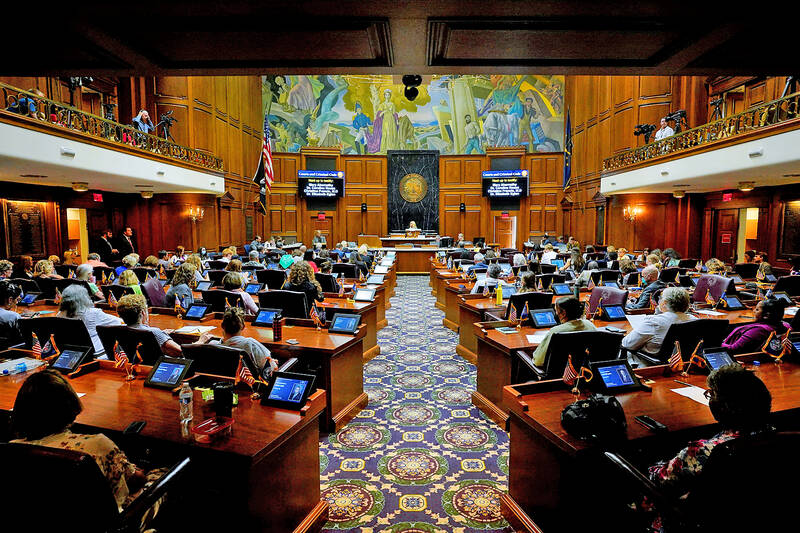The Indiana Senate has passed a resolution urging local businesses to call Taiwan “Taiwan,” the Taipei Economic and Cultural Office in Chicago said yesterday.
The resolution was proposed by State Senator Jon Ford, cochair of the Indiana Taiwan Friendship Caucus, and State Senator Michael Young, the office said, adding that it passed without objection on Thursday.
The resolution aims to reaffirm Indiana’s commitment to deepen its sister-state relationship with Taiwan, which was established in 1979, and support the Taiwan Relations Act, which was passed in the same year.

Photo: Reuters
The resolution calls on all businesses in Indiana to use the name “Taiwan” instead of belittling the nation by using inappropriate names due to external pressure.
The Indiana Senate urged the US government to sign agreements in bilateral trade and other matters to eliminate double taxation with Taiwan, as they could strengthen relations between the two sides, the office said.
The resolution also calls for Taiwan’s inclusion in the Indo-Pacific Economic Framework, which was launched by the US in May last year, it said.
Taiwan is Indiana’s sixth-largest market for exports in Asia, with the total value of exports reaching US$240 million in 2021, it said.
The resolution supports Taiwan’s meaningful participation in international organizations, where Taiwan can contribute to international society, it said.
Office Director-General Johnson Chiang (姜森) welcomed the resolution and thanked the caucus for firmly supporting Taiwan.
Indiana is an important trade partner to Taiwan, as the two sides are cooperating more closely on agriculture, manufacturing and high-tech supply chains, Chiang said in a statement.
The resolution’s passage indicates that Midwest states, the US’ manufacturing strongholds, are interested in signing bilateral trade agreements with Taiwan, he said.
Calling Taiwan by its real name not only shows respect for Taiwanese, but is in line with the US’ position when dealing with Taiwan, he said.
The “six assurances” and the Taiwan Relations Act are important to the US’ Taiwan policy, and crucial to maintaining peace in the Taiwan Strait, he added.

Taiwan is projected to lose a working-age population of about 6.67 million people in two waves of retirement in the coming years, as the nation confronts accelerating demographic decline and a shortage of younger workers to take their place, the Ministry of the Interior said. Taiwan experienced its largest baby boom between 1958 and 1966, when the population grew by 3.78 million, followed by a second surge of 2.89 million between 1976 and 1982, ministry data showed. In 2023, the first of those baby boom generations — those born in the late 1950s and early 1960s — began to enter retirement, triggering

ECONOMIC BOOST: Should the more than 23 million people eligible for the NT$10,000 handouts spend them the same way as in 2023, GDP could rise 0.5 percent, an official said Universal cash handouts of NT$10,000 (US$330) are to be disbursed late next month at the earliest — including to permanent residents and foreign residents married to Taiwanese — pending legislative approval, the Ministry of Finance said yesterday. The Executive Yuan yesterday approved the Special Act for Strengthening Economic, Social and National Security Resilience in Response to International Circumstances (因應國際情勢強化經濟社會及民生國安韌性特別條例). The NT$550 billion special budget includes NT$236 billion for the cash handouts, plus an additional NT$20 billion set aside as reserve funds, expected to be used to support industries. Handouts might begin one month after the bill is promulgated and would be completed within

NO CHANGE: The TRA makes clear that the US does not consider the status of Taiwan to have been determined by WWII-era documents, a former AIT deputy director said The American Institute in Taiwan’s (AIT) comments that World War-II era documents do not determine Taiwan’s political status accurately conveyed the US’ stance, the US Department of State said. An AIT spokesperson on Saturday said that a Chinese official mischaracterized World War II-era documents as stating that Taiwan was ceded to the China. The remarks from the US’ de facto embassy in Taiwan drew criticism from the Ma Ying-jeou Foundation, whose director said the comments put Taiwan in danger. The Chinese-language United Daily News yesterday reported that a US State Department spokesperson confirmed the AIT’s position. They added that the US would continue to

The National Development Council (NDC) yesterday unveiled details of new regulations that ease restrictions on foreigners working or living in Taiwan, as part of a bid to attract skilled workers from abroad. The regulations, which could go into effect in the first quarter of next year, stem from amendments to the Act for the Recruitment and Employment of Foreign Professionals (外國專業人才延攬及僱用法) passed by lawmakers on Aug. 29. Students categorized as “overseas compatriots” would be allowed to stay and work in Taiwan in the two years after their graduation without obtaining additional permits, doing away with the evaluation process that is currently required,